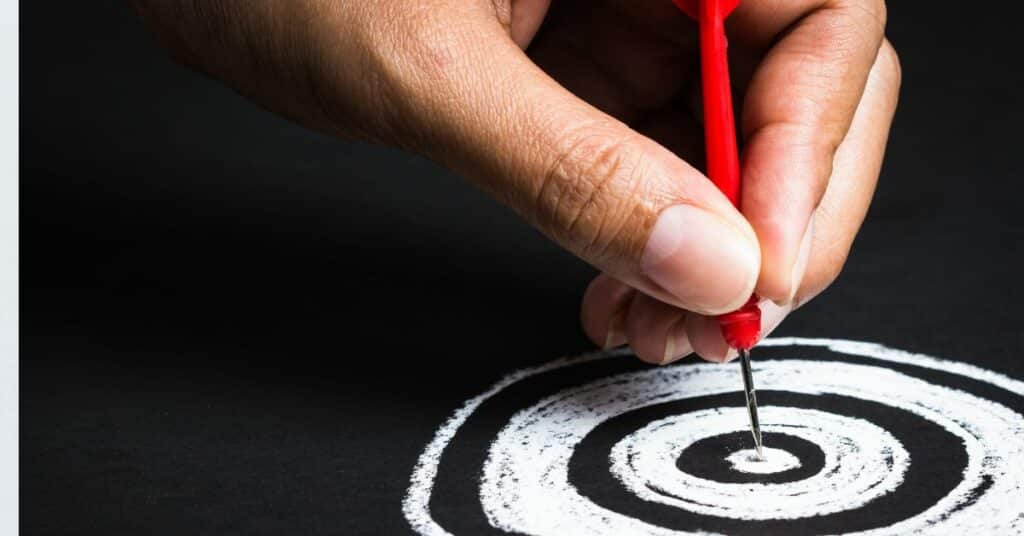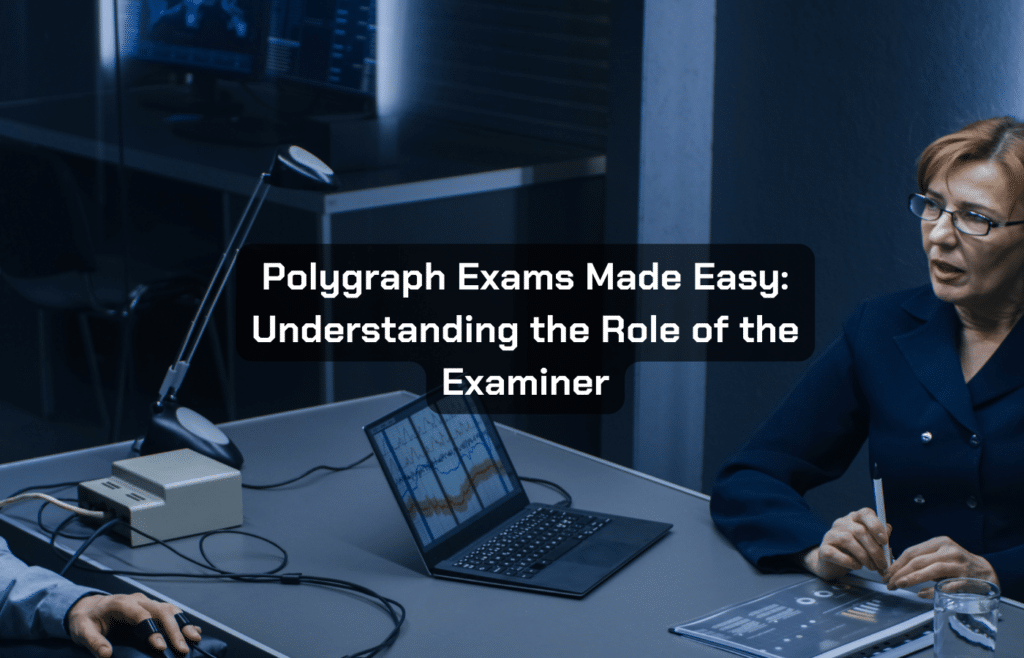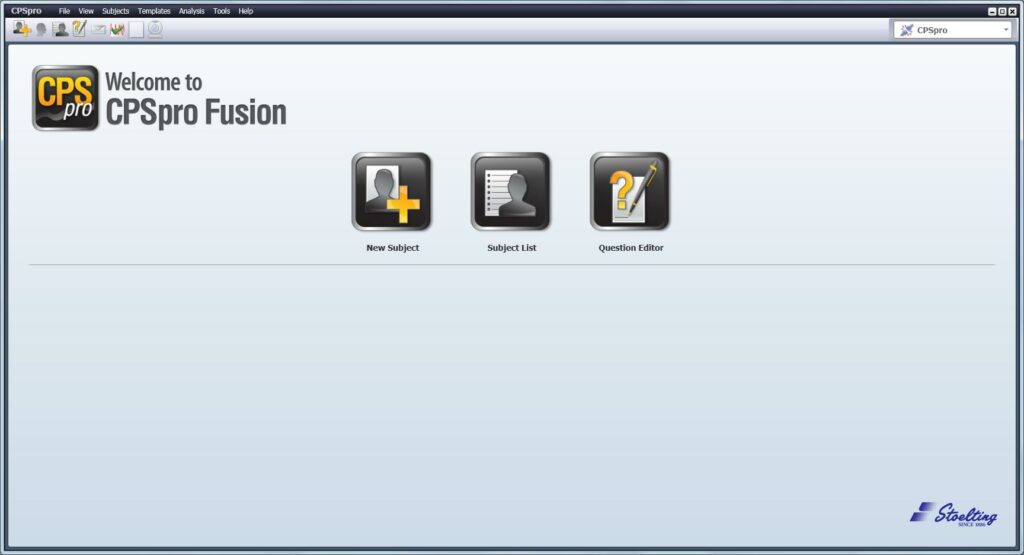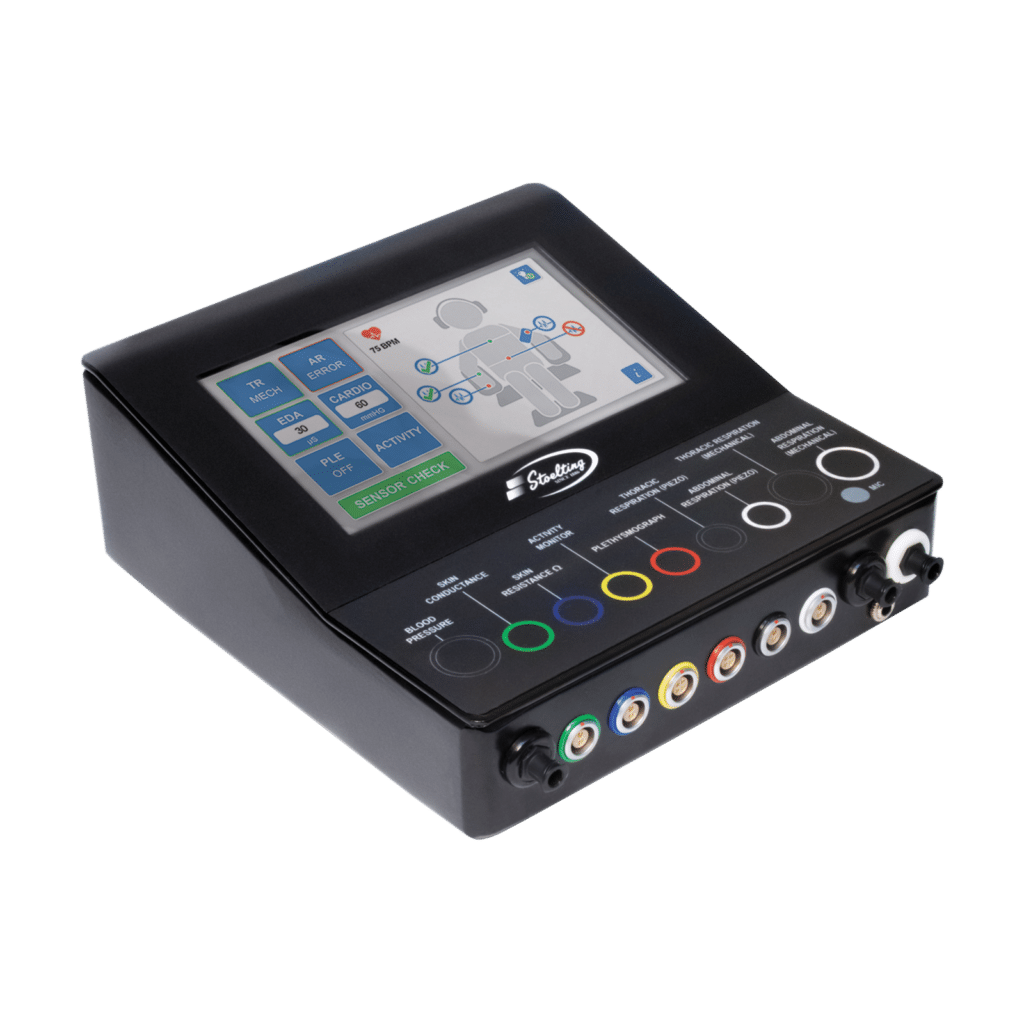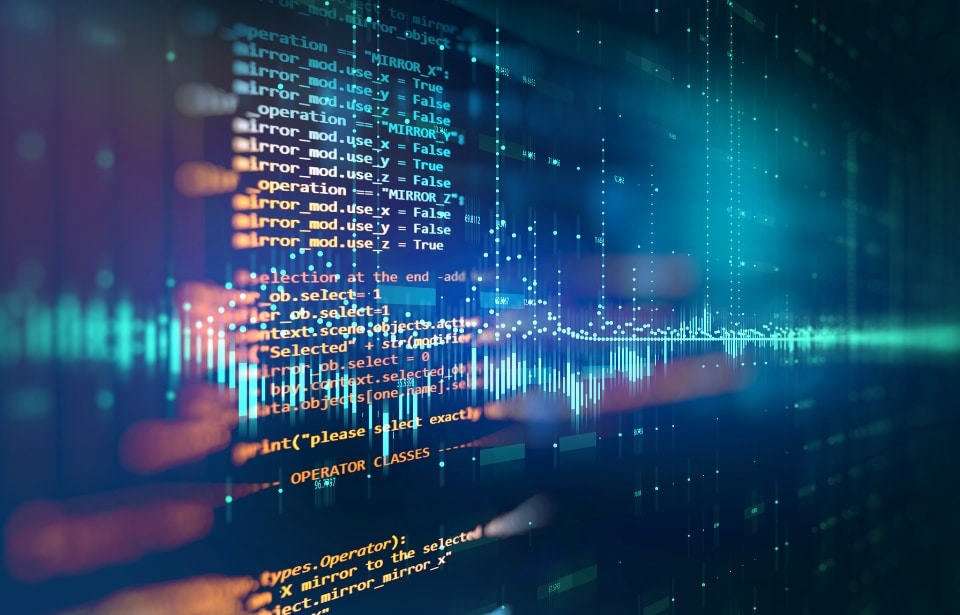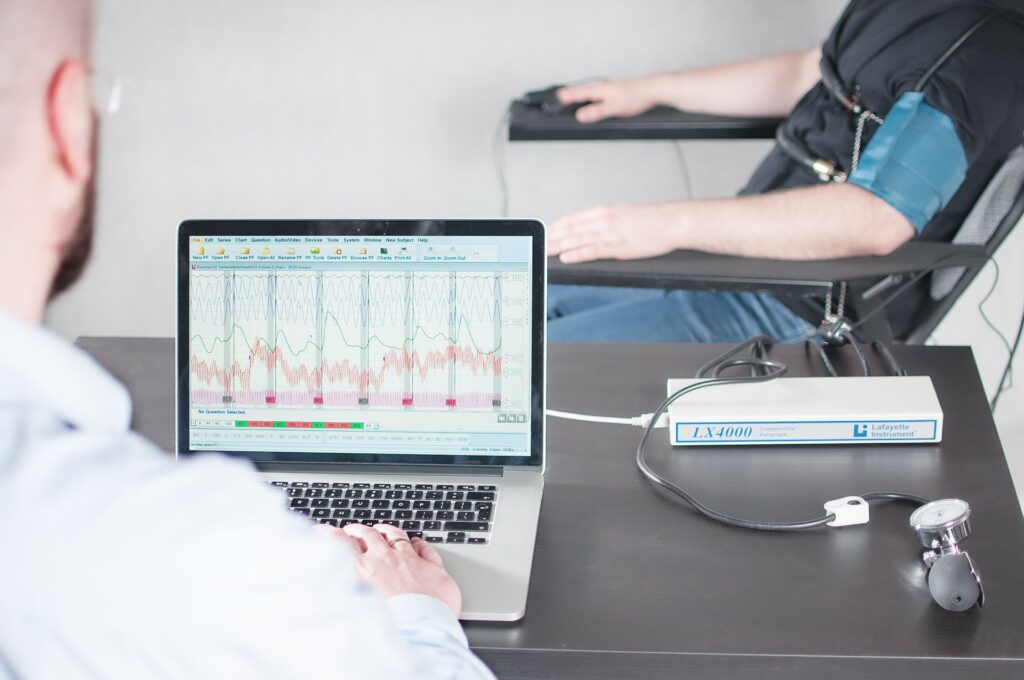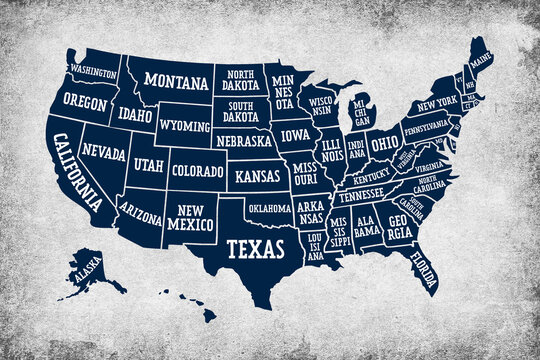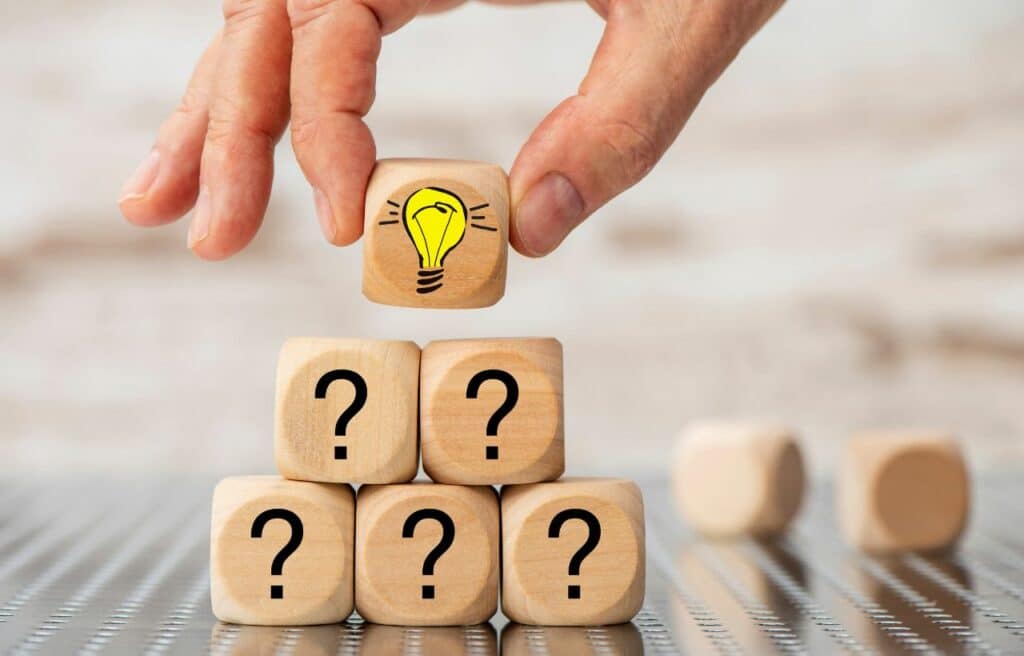The polygraph, commonly known as a lie detector, is a sophisticated instrument used in various sectors, from law enforcement to private security. At the heart of this technology are the manufacturers who design and produce these intricate devices. This article highlights the leading polygraph manufacturers and their contributions to the field of lie detection.
We prioritize accuracy in lie detection, exclusively using the most advanced polygraph instruments. Rigorously selected for precision and reliability, our technology ensures trustworthy results. Our examiners, supported by cutting-edge systems, uphold the highest standards of professional integrity, constantly integrating the latest advancements. Your trust is our commitment, as we strive to be your reliable partner in truth verification.
Top Polygraph Manufacturers:
- Axciton Systems, Inc.: Axciton Systems, Inc. is a pioneer in computerized polygraph systems. Their focus on developing reliable, high-tech polygraph equipment has positioned them as a go-to for professionals worldwide.
- Lafayette Instrument Company: Lafayette Instrument Company is renowned for its precision and innovation in polygraph technology. They have been a leading supplier since 1947, offering a range of polygraph equipment known for accuracy and reliability.
- Limestone Technologies: Limestone Technologies stands out for its commitment to research and development. Their polygraph solutions are some of the most technologically advanced, integrating sophisticated algorithms and software for enhanced analysis.
- Stoelting Co.: With over a century of experience, Stoelting Co. is another key player in the industry. They specialize in producing user-friendly polygraph machines that incorporate advanced technologies for accurate results.
Advancements in Polygraph Technology: These manufacturers are not just producing machines; they are constantly innovating. Modern polygraphs are integrating AI and machine learning for more refined results, making them indispensable tools in truth verification.
People are deceptive. It’s a fact. Chances are you can recall a recent incident where you told a lie. There could be several reasons for your transgression, regardless of the logic behind your decision.
Discerning truth from falsehoods is challenging, and in 1878, the Italian physiologist, Angelo Mosso, invented the plethysmograph. The device measured physiological reactions in people when questioned. The machine analyzed cardiovascular and respiratory responses to discern if they were telling the truth or being deceptive.
Over the following century, other scientists built on this technology, refining it to the lie detector systems we know today.
1. Axciton Systems, Inc.
Axciton Systems, Inc. was the first organization to manufacture a digital computerized polygraph system. The company spent the last 25 years developing and advancing the technology, focusing on the science of polygraphs and how to integrate it with functional, accurate polygraph tech.
Axciton relies on the feedback it receives from polygraph examiners using its systems to continue to advance its science and systems. The company has a quick turnaround time for implementing new strategies in its polygraph tech, improving accuracy and efficiency in its range of polygraph products and software.
Axciton dedicates its resources to examiners, offering one of the best polygraph systems available, thanks to the tech constantly evolving and maturing over time. Axciton has a catalog of highly effective algorithms, such as the ‘White Standard’ and ‘White Devagus-Despike,’ which ensure polygraph examiners’ outstanding overall accuracy during the examination.
The company continues its research and development into the hardware and software systems involved in the polygraph examination process. Its tools enhance the scoring ability of the examiner while simplifying processes involved with the examination and data analysis.
Axciton Systems – Innovation
Axciton offers a comprehensive, versatile, and incredibly powerful software package designed for optimal results in the polygraph process. One of the issues facing examiners during the polygraph interview is detecting physical countermeasures, such as a tack in the shoe or clenching of the sphincter during answers.
Axciton Systems, Inc. introduced the advanced Motion Sensor Pad to eliminate these countermeasures during the examination process. This pad’s sensitivity is so refined that it detects even the slightest contractions and toe curls without needing additional attachments to the polygraph system.
The Motion Sensor Pad from Axciton is lightweight and easy to install and use. Axciton Systems, Inc. was also the first digital polygraph company to develop and release the piezoelectric pressure sensor technology relying on piezoelectric crystals to convert vibration to electrical impulses or vice versa.
The new and improved five-channel sensor box runs on the Windows-based software offered by the company. Axciton Systems, Inc. dedicates itself to advancing and developing cutting-edge polygraph systems and software, continuously implementing new features that meet the needs and requirements of examiners.
Axciton Systems – Hand Scoring Tools
The latest update to the Windows Software offered by Axciton introduces the ‘Hand Scoring Tool,’ showing the option of selecting a 3-point and 7-point scoring system. Examiners also have the choice of choosing the sequence of questions they want to score.
The Axciton Hand Scoring Tool provides a total score per question, calculating a total for all inquiries. At the end of the examination, the examiner can call for the selected spot and session. Unlike other hand-scoring tools, the examiner can resize windows to make them more visually appealing.
Axciton Systems – STAR
Examiners can also create unlimited hand-scoring tables for the examination session. However, the Axciton system excels with the development of hidden primary bimodal data populations from secondary bimodal populations using its STAR math algorithm.
At the core of polygraph scoring methodologies, we find how to combine scores from individual polygraph channels in a means that closely approaches a truthful state or correct deceptive within the mind of the polygraph subject.
Axciton defines this as ‘scoring accuracy’ in creating the deceptive bimodal/ hidden, unseen truthful population. The clarity, countermeasure controls, and the stability of emotional channels outside fear during the polygraph exam are separate from its scoring accuracy. Axciton published these findings in a different paper on the DRIFT concept.
This overview of the STAR algorithm concerns scoring accuracy alone and not with the DRIFT concerns, which Axciton uses for separate R&D directions.
STAR math is the product of the insights on polygraph tech and systems developed by Bruce White. Most of the data that’s required to create the hidden, unseen bimodal data population features in the relationship of separate convolutional systems. These systems come embedded in secondary bimodal data populations, such as electrodermal, pneumo, or cardiovascular data sets.
This specialist deconvolutional relational process method is proprietary to Axciton. Still, it forms the foundation of the exceptional scoring accuracy available for the STAR algorithm in the lab and the field on confirmed cases.
Regarding accuracy, the lab data from Axciton shows confirmed cases for NDI populations at 93% with no false hits in the population 336 Zone, MGQT, and 2QZone. It offers 92% accuracy for DI population 483 Zone, MGQT, and 2QZone.
DI confirmed populations did experience 2% false readings but didn’t have motion channels. These sessions may have experienced unconfirmed countermeasure oddities, such as heavy MI. Countermeasure attempts are greater in DI populations when compared with NDI populations. So, most STAR users already own a motion pad sensor to reduce the efficacy of these countermeasures by examinees.
Approximately 60% of this population includes four past APA presidents, q/c departments, and other professional leaders. There is no report of a confirmed non-DRIFT inaccuracy or false hit in the last five years. STAR has integrated into the use of Axciton motion pad STAR users.
The only drawback with STAR is its inability to know when it runs a bad examination. It expects clarity of issue from the examiner, effective countermeasure controls, and proper DODPI techniques and procedures on single-issue tests. With these methodologies in place, STAR achieves consistent accuracy that exceeds expectations.
While the STAR algorithm costs a hefty $2,500, it comes with unlimited free email processing for Axciton customers. STAR users may also process colleagues’ charts for free. Overall, Axciton offers one of the best polygraph systems available on the market, and it’s a top choice for examiners in any industry.
2. Lafayette Instrument
Lafayette Instrument is a leading brand in polygraph tech and possibly the biggest name in the industry. Max Wastl founded the company after he immigrated to the US, studying electrical engineering at Purdue University.
He established the Lafayette Instrument Company in 1947 after completing his degree. The company started in a small shed with a single employee. Lafayette started exploring polygraph technology, psychological testing, and physiological recording instrumentation.
Exploring the Advanced Features of the LXSystem LX5000 Polygraph System
Lafayette Instrument – Acquisitions
The ongoing company expansion drew international attention to the company. As a result, Lafayette acquired Campden Instruments in 1998, intending to make it a complement and extension to Lafayette’s product line.
In 2016, Lafayette saw a growing need in the market for science-based credibility assessment training. As a result, it launched the ‘PEAK Credibility Assessment Training Center.’ The project aimed to deliver world-class data measurement, analysis, and acquisition software and instrumentation to advance security, safety, and science.
Lafayette continues to innovate and refine its processes and products for its clients. The premium LX Software from the company offers a ground-breaking ESS-M Interpreter further to improve the scientific accuracy of its data interpretation.
The innovative ‘Respiration Line Excursion (RLE) Tool’ effectively measures the ratio of relevant biological and physiological responses divided by the comparison response to produce a recommended ‘pneumo score.’
Examiners can visually analyze and compare changes in pulse amplitudes with the PLE Pulse Amplitude Tool. The examiner gets a simple step-by-step process for generating paperless reports and charts. The innovative tech pairs seamlessly with the ‘Memory Ping’ functionality, offering fast and easy CIT testing and interviews.
The LX Software is accessible and available in GSR or GSC, with manual, automatic, and detrended modes. Users receive free downloads for life, bundled with OSS-3, PolyScore, and drug reference documentation.
The ‘Memory Ping’ permits investigators to conduct their testing on subjects to determine involvement in crimes under investigation. It achieves it by detecting information in the suspect’s memory during the examination.
The suspect experiences uncontrollable physiological reactions while detailing the crime. It picks up reactions that don’t occur in innocent individuals. Memory Ping allows examiners an easy pathway to finding out if the suspect knows the information.
3. Limestone Technologies
Lafayette Instrument acquired Limestone Technologies, making it a division of the company. Limestone Technologies is committed to continuous innovation of instrumentation solutions and software that contributes to securing and safeguarding the community.
Limestone Technologies was established in 2003, unveiling the Polygraph Pro Suite as its flagship product. The company quickly dominated the space of polygraph instrumentation and software, catching the attention of Lafayette.
Limestone promises examiners unmatched reliability, unparalleled performance, and unrivaled innovation. While the company focuses on providing instrumentation and software, in 2017, the company started to concentrate on polygraph training and education.
Before its acquisition by Lafayette, Limestone acquired the ‘Backster School of Lie Detection.’ As one of the oldest and most established polygraph schools, it provides world-class polygraphy training for polygraph examiners.
Lafayette Instrument Company acquired Limestone Technologies in August 2022, with the company president, Jennifer Rider, issuing the following statement on the purchase.
“We are very pleased to bring these two companies together to achieve our collective potential and maximum effectiveness and efficiency for the benefit of our customers.”
Limestone Technologies has its headquarters in Kingston, Ontario. It has a complete staff complement and operates independently of Lafayette. The company has sales and customer service to help examiners select the right equipment to match their requirements in the field.
Limestone Technologies Inc. is a reliable and trusted provider of specialist psychological and medical services, products, and solutions, focusing on public safety and security. The management remains committed to elevating the brand through commitment to quality, innovation, and world-class customer service.
The company continues to increase awareness of its data acquisition solutions and grow its reach in the market. It relies on open-minded communication with its clients, producing a mutually beneficial synergy between the company and its clients and increase customer loyalty.
Limestone Technologies – A History
It’s a respected company in polygraph credibility assessments and sex offender management. The company specializes in bringing expertise and knowledge to customized solutions for biofeedback instrumentation. Limestone Technologies prides itself on creating a close relationship with its clients, using feedback to refine and develop its software and systems.
Limestone Technologies Inc. provided two security and public safety data acquisition solutions in 1999. Limestone has a reputation in the market as a leader in excellence and innovation. They’re known for quality polygraph phallometric solutions and eager to apply their attention and experience to other similar technologies.
The company delivers medical-grade instrumentation with intelligent software design, bringing a selection of sub-markets with similar requirements. Limestone introduced its ‘Polygraph Pro Suite Products’ in 2003, developing its systems and software in collaboration with its examiners.
The Polygraph Pro Suite delivers a user-friendly software interface and exceptional chart quality that is the industry’s benchmark. The ParagonX Acquisition System is possibly the most powerful polygraph data acquisition system available on the market. These instruments go above and beyond leading polygraph systems offered by other manufacturing brands to dominate the field of polygraphs.
Examiners have a choice of high retention USB to dual channel 32 bit, delivering performance and reliability with the high retention USB. ParagonX utilizes the High Retention USB system, providing a 7.5X increase in data transfer rates and a 20X increase in bandwidth.
Limestone Technologies – ParagonX Software
The ParagonX software offers industry-leading sampling rates, 625 samples per second per channel. These specs make it the highest sampling rate in polygraph instrumentation. Polygraph examiners need equipment they can trust to make accurate and informed assessments without overlooking or compromising performance, precision, and design.
ParagonX is the first upgrade to its best-selling polygraph system. The project engineers work behind the scenes, enhancing the software to create the most intuitive and powerful acquisition system on the market.
Limestone Technologies offers a trade-in program for examiners. They can exchange their original Paragon, DataPac, or if they want to switch from competitors’ instruments. With this program, examiners can save up to a $2,700 discount on the new equipment and software.
Limestone Technologies offers a very expensive solution, but it’s a world-class system and software designed for professionals that demand the best.
4. Stoelting
Stoelting is another leading brand in polygraph technology. It’s one of the oldest companies in the space, founded as ‘Chicago Laboratory Supply and Scale Company’ in 1886. Today, it’s undergone a name change, but it still produces some of the highest-quality polygraph technology in the industry.
Stoelting Co. has four separate divisions, making it a highly diversified company. The core product lines are physiological, psychophysiological, and psychological measurements—the inter-relationship structure of its offering results in exceptional synergy and ideas across the company.
Breakthroughs in one division usually end up in applications in other company divisions. This dynamic environment is central to Stoelting’s growth over the last century of its operations. Christian Hans Stoelting was a pioneer in psychological and physiological apparatus development.
Stoelting – A History
Stoelting built the company into one of the most respected organizations in the scientific community, cementing its reputation as a top player in the space. Stoelting founded the company in 1903, making it one of the oldest players in the polygraph industry. From 1903 to 1943, it was a dominant force in American psychology.
At the St. Louis Universal Exposition in 1904, Stoelting Co. received medals for ‘Anthropometric Apparatus and Psychometric Apparatus.’ The company started with humble beginnings on the west side of Chicago, moving to its modernized headquarters in Wood Dale, Illinois.
Stoelting maintained its tradition of manufacturing and distributing superior polygraph instruments worldwide. Stoelting’s Polygraph Division is a pioneer in the polygraph field, with many other companies imitating its advancements.
Stoelting – Developing Polygraph Technology
In 1935, Stoelting was the first to create the Cardio-Pneumo Polygraph, and it stayed at the cutting edge of technology, providing the highest caliber instruments. The middle of the twentieth century brought many advancements for the Stoelting range of polygraph technologies.
Stoelting is the top-tier choice for prominent polygraph schools and examiners. The company introduced the Reid polygraph in 1951, a five-channel model that recorded signals from respiration, arm movements, blood pressure, GSR, and leg movements.
In 1958 Stoelting debuted the ‘Deceptograph,’ with the US Military standardizing the technology throughout the armed forces. In 1966 Stoelting designed and developed the non-battery powered galvanometer polygraphy. In 1974, Stoelting debuted the first all-electronic polygraph system.
In 1978 The Stoelting Ultrascribe debuted, becoming the company’s most successful system. Its modular design allows for three to five channels, giving the examiner more freedom to choose how many channels they want to implement, along with inexpensive upgrades that are easy to implement.
In 1982, Stoelting released the ‘Executive Ultrascribe.’ It was more compact than its predecessor and lighter. The improvements in the device’s form factor made it become the US military’s official polygraph system. The Ultrascribe II was released in 1983, featuring the first-ever polygraph with microprocessor-controlled re-centering.
As computer-assisted polygraphy technology took off in the late 1980s, Stoelting launched its Computerized Polygraph System in 1992, entering the digital age of polygraph tech. This shift brought about superior flexibility and accuracy to the polygraph.
Today, Stoelting’s CPSpro is the benchmark standard of computerized polygraph tech. It implements cutting-edge algorithms, amazing accuracy, and user-friendly features, making it one of the best systems in this review.
Examiners can depend on Stoelting’s polygraph systems for high-quality, reliable polygraph instruments and excellent user support from its team of knowledgeable and educated customer service specialists. It’s a top choice for examiners and one of the leading companies in polygraph systems.
Next: How to become a Polygraph Examiner
What is a polygraph?
The word ‘polygraph’ means ‘many writings.’ The device’s name refers to recording select physiological activities occurring in the body during questioning. A polygraph examiner may use conventional analog or digital instruments during the process.
The polygraph collects physiological data from physiological systems using electric sensors fitted to corrugated rubber tubes. The examiner places the pipes across the examinee’s abdomen and chest to record respiratory activity.
The two metal plates fitted to the fingers act as adhesive electrodes, recording perspiration activity, and a blood pressure cuff analyzes cardiovascular action. These are the basic instruments used in a polygraph test.
However, some practitioners may include finger plethysmographs to monitor blood volume in the fingertip or motion sensors to monitor general movement that interferes with the test data.
The typical polygraph examination includes a pre-test interview, chart collection phase, and analysis phase. The pre-test involves the polygraph examiner introducing the examinee to the parameters and specifics of the test.
The chart collection phase involves the examiner administering and collecting several polygraph charts. These questions vary depending on the questions, issues, and techniques used by the examiner. Following the chart collection phase, the examiner analyzes the charts to determine whether the examinee is truthful or deceptive in their answers.
Who Uses Polygraphs?
Four sectors use the polygraph, including the private sector, legal practitioners, law enforcement, and government agencies.
- Private Sector
Corporations and companies execute polygraphs under the limitations and restrictions of the Employee Polygraph Protection Act of 1988. For instance, if you operate a cash business like a gold exchange, you might initiate a polygraph for new hires to ensure they don’t have drug problems, gambling addictions, or hidden agendas involving conducting criminal activity after their hiring.
- Legal Community
The U.S. Attorney Offices, Public Defender, District Attorney Offices, Parole & Probation Departments, and defense attorneys utilize polygraphs. The court systems also use these tests in cooperation with parole and probation officers and psychotherapists to monitor sex offenders. Attorneys may also use the polygraph in civil litigation proceedings.
- Law Enforcement Agencies
Federal, state, and local law enforcement agencies such as sheriffs and police departments. May use polygraphs when interrogating suspects.
- Government Agencies
The Department of Defense and agencies like the CIA and FBI may use polygraphs when hiring staff or interrogating suspects.
10 Ways Honest Individuals Can Pass a Polygraph Test
Are you taking a polygraph exam at work? Why would your boss make you do it if you've done nothing wrong? You're an honest, hardworking person with nothing to hide. Well, then you have nothing to worry about, so don't stress about it. Despite it being true that...
Are Polygraph Exams Accurate?
There's some controversy around polygraph science about exam results' accuracy. Speak to technology advocates, and they'll tell you the lie detector machine is up to 97% accurate at detecting deception. Detractors state it's far lower than that, with test results...
Are Lie Detectors Important for National Security?
A polygraph is an essential tool all agencies involved in national security rely on. The polygraph plays a significant role in how these organizations approach internal employee hiring and maintenance and field operations. The polygraph has been in operation...
Everything You Need to Know About Polygraph Exams for Sex Crime Victims
It's a sad fact, but sex crimes occur across America every day. Millions of men and women across the country are affected by sexual violence, with the statistics showing an assault occurs every 73 seconds in some corners of the United States. On average, there are...
What are the Forensic Standards for Polygraph Examiners?
Polygraphy is serious science. In all instances of polygraph exams, the outcome of the lie detector test can have serious consequences for the examinee. Whether the test is for pre-employment or employee screening, sex offender or victim testing, or criminal...
Understanding Voice Stress Detection – What Is It?
People frequently lie in their lives. Research shows most people lie every day. Typically, most of the lies they tell are insignificant, with no real consequence. For instance, telling your partner, they look good in that dress when you think the opposite is a...
Understanding the Employee Polygraph Protection Act
If you're an employer, you might think you have the right to polygraph new employees or your staff. However, that's not always the case. If you're an employee, you need to know you're right surrounding what your employer can ask of you concerning polygraph exams....
Trust the Polygraph, Not Your Instincts – Why People Lie
Have you ever confronted someone about something they did, and you knew they were lying to you as they replied and made lame excuses? It's a frustrating experience knowing they're blatantly deceiving you, but there's no way to call them out for their deception...
What are the Instruments Used in Polygraph Testing?
Are you going for a polygraph exam soon? You're probably wondering what the experience will bring. Undertaking a lie detector test can be a harrowing experience if you don't know what to expect. When you understand the procedure of the polygraph exam, the types of...
What to Expect on the Day of Your Polygraph Test
Are you expected to take a polygraph exam by your employer? If you work in the private sector, your employer must provide ethical motivation for you to undertake the test. Their reasoning for implementing the polygraph policy must comply with the regulations and...
Polygraph Testing – Celebrities Caught Lying
Celebrities have the problem of people placing them on pedestals. The reality is they're people like everyone else and make the same mistakes as the average Joe or Jane. Besides wealth and fame, the main difference between celebrities and common people is that they...
Your Life Before Undertaking the Lie Detector Test
Did your boss tell the office he's discovered someone's embezzling from the client accounts? Or maybe he's noticed that someone's stealing inventory. He notifies the team he's called a polygraph technician into the office tomorrow morning to give everyone a...
The Portrayal of Polygraphs in Media
Polygraph technology changed the way law enforcement interrogated suspects. Before the introduction of this technology in the 1920s, law enforcement would have to rely on the evidence at hand. A suspect could lie their way through interrogation, with no way for law...
What are the Different Types of Lie Detector Machines?
The modern polygraph is a product of nearly 150 years of invention and innovation. Today's modern devices are nothing like the first machines put into service in the 1910s and 1920s. They operate on computerized systems, yielding remarkably accurate results. Along...
What’s the Difference Between a Polygraph and CVSA?
The industry of deception detection long relied on the polygraph as the sole tool for uncovering the truth in private and public-sector applications. Particularly, law enforcement found the introduction of the polygraph in the 1920s a useful way to prove their...
The Limitations of the Polygraph – Issues in Technology & Science
Discover the limitations of polygraph tests in exam scenarios, including countermeasures, pathological liars, and legal admissibility. Learn about the impact of technology on polygraph testing and its place in modern industry applications.
What is Othello Syndrome
Learn about Othello Syndrome, a rare psychological condition that causes individuals to become convinced their partners are unfaithful. Discover the triggers, effects on relationships, and potential treatments. Also, explore the use of lie detectors and polygraphs in detecting infidelity.
The Dos and Don’ts of Taking Lie Detector Tests
Learn the dos and don'ts of taking a lie detector test. Discover tips such as preparing for your exam, researching the polygraph, and understanding your rights. Find out what to avoid, including panic, irrational behavior, and medication use. Follow these guidelines to improve your chances of passing a lie detector test.
What Does a Polygraph Machine Look for in a Liar?
What Does a Polygraph Machine Look for in a Liar? Polygraph machines are sophisticated devices. This technology has come a long way since the invention of the first modern lie detector by John Larson in the 1920s. Today's machines feature advanced software...
Can I Beat a Polygraph Exam If I’m Guilty?
Can one outsmart a lie detector test, even if guilty? Explore the intricacies of polygraph exams, uncovering the truth about their accuracy and the techniques some use in attempts to deceive.
5 Reasons Why a Polygraph Test May Not Be Accurate
Have you heard the rumors online that polygraph exams might not provide accurate results? There are stories littered across the internet stating people have proven methods for beating the polygraph and that the lie detector test found them acting deceptive...
3 Reasons to Avoid taking a Polygraph Exam
Most people feel a mix of fear, anxiety, and curiosity when they learn they have to take a polygraph exam. We've all seen them in the movies, and it's portrayed as a harrowing procedure. You're sitting in a chair with an examiner grilling you about every detail in...
Introducing the LX5000 Computerized Polygraph System
Explore the LX5000, the peak of polygraph tech, blending advanced lie detection with ease of use for professionals. Precision and flexibility redefine polygraphy.
Understanding the Fight-or-Flight Response and the Lie Detector Test
Are you feeling anxious and nervous about your upcoming polygraph exam tomorrow? What's going on with your body, and why do you feel this way? You've done nothing wrong, and you're not the person responsible for stealing the inventory, so why should you feel...
The Role of the Examiner in the Lie Detector Test?
If your company requested you to take a polygraph exam or you're a candidate going for a pre-employment polygraph screening, you probably don't have any experience with it. The purpose of the "lie detector test" is to determine if you have the characteristics of...
Stoelting CPSpro Fusion Software
CPSpro Fusion redefines polygraph testing with its intuitive UI, advanced chart recorder, dynamic question editor, and scientifically validated scoring. Experience unparalleled efficiency and reliability in polygraph examinations.
Stoelting CPS Elite Polygraph Systems
Elite Polygraph redefines truth verification with Stoelting’s cutting-edge Fusion software and hardware, offering unparalleled precision and reliability. With a unique built-in display and state-of-the-art electronics, it sets a new benchmark in polygraph technology.
How Software Changed the Lie Detector Test
Explore the transformative journey of lie detection technology from mechanical marvels to digital accuracy. Delve into the pioneering work of Larson and Keeler, the digital revolution in the 1990s, and the cutting-edge advancements brought by software and AI. Uncover the controversies, the leaders in lie detection software, and the future implications of AI in uncovering deception. A must-read for enthusiasts and professionals in the field of lie detection.
9 Elements that can Affect the Outcome of a Lie Detector Test
Discover the intricacies of polygraph exams and their 97% accuracy rate. Learn about the nine factors influencing outcomes, from the examiner's role to the examinee's nervous system response. Gain insights into how preparation, routine, and even diet can impact test results, ensuring a fair and accurate assessment. Understand the role of the experienced examiner in interpreting data correctly.
John E. Reid – The Father of Polygraph Questioning
Explore the transformative impact of John E. Reid on polygraph technology, with his "Reid Technique" setting the gold standard in interrogation practices. His innovative approach significantly advanced the field, enhancing the accuracy and efficacy of lie detection methods.
Axciton Systems: Setting the Gold Standard in Polygraph Technology
Axciton Systems, a leader in polygraph technology since 1989, revolutionizes lie detection with advanced systems used globally by law enforcement and government bodies. Known for precision and innovation, Axciton's commitment to research ensures cutting-edge solutions in deception detection, setting industry standards in polygraph examination.
Preventing Intimidation During a Lie Detector Exam
Undergoing a polygraph test can be daunting, but understanding the process and the examiner's role can ease concerns. In the U.S., examiners adhere to strict ethical guidelines, ensuring the test is conducted professionally without intimidation. It's crucial to report any misconduct to maintain the integrity of the process.
Lie Detector Tests – What Physiological Responses Occur When We Lie?
Polygraph tests can be anxiety-inducing, but understanding the science behind why we lie and the body's response can help. Studies reveal frequent lying in conversations, often for self-preservation or to avoid reprimand. Lying triggers a stress response in the body, detectable by polygraphs, making it challenging to deceive the test.
Can You Deceive Polygraph Testing?
Facing a polygraph test can be nerve-wracking, not due to guilt but the fear of privacy invasion. Despite myths, beating a polygraph, especially by controlling stress responses, is highly unlikely. Professionals assert its accuracy, focusing solely on relevant issues, not personal secrets. Understanding the process can alleviate fears, emphasizing honesty and routine maintenance before testing. Missteps like changing daily habits can inadvertently trigger false signals. Transparency and consistency are key to navigating the polygraph without undue stress.
How to Uncover Pathological Liars with Polygraph Services
Uncovering pathological liars, like the case of "The Liver King," reveals the complexity of deception. Pathological liars differ from those telling white lies or compulsive liars by their lack of guilt and belief in their falsehoods. Polygraph tests, while effective for many, may not always detect pathological liars due to their unique psychological makeup. The fight-or-flight response, typically triggered by lying, may not activate in them as they might not perceive their lies as deceitful. Thus, the efficacy of polygraph tests in such cases can vary, heavily reliant on the skill of the examiner to interpret subtle cues beyond physiological responses.
A Brief History of the Lie Detector Test
From ancient methods to sophisticated technology, the polygraph has evolved significantly. Originating with simple techniques in ancient China, it transformed through pioneers like Mosso, Larson, and Keeler. Today, digital advancements enhance its accuracy, making the polygraph a key tool in truth detection despite debates on its reliability.
Analog and computerized lie detectors
Dive into the mechanics of truth with our blog post exploring the evolution of lie detector testing equipment. From the era of analog polygraphs to today's sophisticated computerized systems, learn about the technologies that aim to unveil the truth. This post breaks down the components and operation of both analog and digital polygraphs, their usage, and the physiological responses they measure, providing a comprehensive understanding of lie detection technology.
Ancient Ways of Detecting Lies
Explore the intriguing ancient methods of lie detection, from the ordeals of boiling water and hot iron tests to the psychological tactics used by early civilizations. Understand how these rudimentary practices laid the foundation for modern interrogation techniques and the continuous quest for truth in human interactions.
Exploring The Uses And Benefits Of Lie Detector Tests
Dive into the fascinating world of lie detector tests, examining their diverse applications from criminal investigations to employment screenings. Discover the benefits these tests offer in enhancing truth verification processes and the pivotal role they play in various professional and legal contexts.
Technological Alternatives to Traditional Polygraph Procedures
Explore the cutting-edge alternatives to traditional polygraph tests in our latest article. Discover how technologies like fMRI and EyeDetect are revolutionizing lie detection with higher accuracy and less intrusiveness, paving the way for more reliable methods in various fields.
What is a lie detector test ?
Discover the intricacies of a lie detector test, a tool designed to unravel truths by monitoring physiological responses like blood pressure, pulse, and skin conductivity during questioning. Delve into how this method seeks to distinguish between truth and deception, shedding light on its applications and the science behind it.
List of Polygraph Associations Across the USA
Discover the intricate network of Polygraph Associations across the USA in our comprehensive guide. Delve into the roles, services, and contact information of these organizations, vital in upholding the standards and ethics of lie detection. Explore regional and national bodies integral to the American polygraph community.
Understanding TS/SCI Clearance and Polygraph Requirements
Explore the essentials of obtaining and maintaining a TS/SCI clearance with a polygraph in our comprehensive guide. Learn about the clearance levels, polygraph purpose, the clearance process, and tips for addressing concerns. Discover key insights into this critical national security requirement.
Exploring The History Of Lafayette Instrument
Dive into the rich history of Lafayette Instrument, a pioneering force in the development of polygraph technology. Uncover the milestones and innovations that have solidified its reputation as a leader in the field, shaping the tools and techniques used in lie detection and beyond.
Marital Trust Issues – Is A Lie Detector Test Necessary?
"Dive deep into the role of lie detector tests in resolving trust issues in marriages. Learn how these tests work, when they are needed, their accuracy, and how they can potentially rebuild or break trust in relationships."
Psychological Profiling In The Polygraph Test
It is true that the polygraph machine can detect psychological responses to a series of questions. The test basically focuses on three indicators of what is known as autonomic arousal. Respiration, skin conductivity, blood pressure/heart rate are the three...
The Evolving Role of Lie Detector Tests in Australia
Exploring the surge of polygraph testing in Australia, from aiding legal investigations to resolving personal disputes. Modern advancements enhance accuracy, yet ethical considerations persist. This tool's growing role reflects Australia's evolving landscape of truth verification.
Lafayette Instrument Company: Revolutionizing Polygraph Technology with LX6 and PARAGONX
Lafayette Instrument Company leads in polygraph technology with the LX6 and PARAGONX, offering advanced features like 10 data channels, superior connectors, and cutting-edge software. These systems provide unparalleled accuracy and ease of use in credibility assessment for global security organizations.
Choosing a Polygraph Lie Detector Test Examiner Guideline
Ensure your US polygraph examiner is APA-accredited for reliable results. Beware of non-accredited individuals and prioritize those committed to ongoing training and using the latest technology. Avoid hidden fees by seeking all-inclusive, fixed quotes.
Lie Detector Test: Pre-test, Test and Post Test stages
The polygraph test, often seen in crime thrillers, is a method to study bodily responses to questions, measuring respiratory, cardiovascular, and skin responses. It involves a pre-test for understanding and preparation, the main test with equipment measuring physiological changes, and a post-test analysis to determine deception. Despite its intimidating nature, the test's accuracy is debated, but it remains a fascinating aspect of investigative processes.
How Police Use Lie Detector Tests To Their Advantage
Over the years, police have devised a variety of innovative and clever ways to bring the bad guys to justice. Their tactics have changed significantly over the past few years, but some things have remained the same. The lie detector test has become a staple of...
Are Polygraph Results Admissible in Court?
Are polygraph results admissible in court? Can law enforcement or your employer use the outcome of a polygraph exam against you in your case? It's a touchy topic, and many assume there's no way the court will use polygraph results against them. However, this may...
What Behavior Does a Polygraph Examiner Look for in a Lie Detector Test?
Are you taking a polygraph exam in the next few days? If so, you're probably wondering how it works. The lie detector test involves two primary elements – the device and the examiner. Understanding how they operate and what they're looking for during the test gives...
Understanding the Key Components of a Polygraph: Pneumograph, Cardiosphygmograph, Galvanograph, and Kymograph
The polygraph is a complex device used for lie detection. Understanding its components and how it works can help alleviate pre-exam anxiety. Learn about the history, components, and accuracy of the polygraph, as well as the future of AI-driven polygraph systems.
Using Polygraph Exams in Pre-Trial Questioning
If you're a defendant in a case, your attorneys will meet with the presiding judge to iron out the details before you go to court. This pre-trial phase occurs in both civil and criminal proceedings, giving the defendant a chance to negotiate a satisfactory outcome...
How Do Mental Health Problems like Depression or Bi-Polar Affect Polygraph Testing?
Are you dealing with mental disorders? Do people with anxiety, depression, bipolar, or related mental illnesses need to be wary of taking a polygraph exam? Can your issues affect the outcome of the lie detector test? Mental health problems affect people's lives...
Should I Be Nervous about My Polygraph Test?
Are you feeling nervous about taking your first Polygraph exam? Relax; it's not going to be as bad as you think. Unless you've done something wrong, there's no reason you need to panic about it. If you have committed a crime, then you're in trouble. Despite what...
The Polygraph Test and Circumstantial Evidence – Understanding the Law
According to the American Polygraph Association (APA), the polygraph is up to 87% accurate at detecting deception in examinees. Polygraph software developers claim their products are up to 97% accurate. So, why are lie detector results not admissible as evidence in...
Polygraphs and Law Enforcement – A Brief History
It might surprise you that the first polygraph wasn't invented to detect deception in law enforcement interrogations. The first "polygraph" came from the mind of Dr. James MacKenzie, a Scottish-born cardiologist. MacKenzie built his device for use in the medical...
Polygraph Technology in the 1990s Vs the 2020s
Explore the evolution of polygraph technology from the 1990s to the 2020s in this comprehensive article. Dive into the advancements, challenges, and implications of lie detection over the decades, from the era of analog devices to the sophisticated digital systems of today.
Compulsive Liar Vs. Pathological Liar
Polygraphs, with an accuracy rate between 87% to 97%, are crucial in security and high-risk sectors. Despite their effectiveness, the system isn't perfect. Compulsive and pathological liars, due to their unique psychological makeup, may present challenges to polygraph tests, with some capable of bypassing detection. Understanding the nuances of these individuals' responses to lie detection requires insight into their psychological traits and behaviors.

